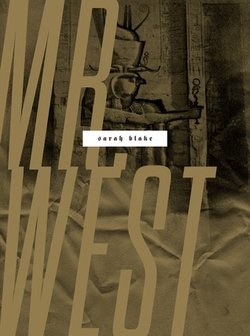One Part Biography, Two Parts Self-Exploration, All Parts Lyric: A Review of Mr. West by Sarah Blake

Hardcover: 132 pages
Publisher: Wesleyan Poetry Series
Purchase @ Wesleyan University Press
Review by Rhiannon Thorne
Most of the privilege has been off the page.
A white woman has privilege but not power.
A black celebrity has privilege but not power and also discrimination.
Has it in his hands, his hood, buried in the pavement against his face.
A white Jewish woman has privilege until she's traveling in France.
Then riots start. Schools and synagogues firebombed.
from “Gaze”
Although Sarah Blake uses Kanye West and his celebrity as the lens through which she crafted Mr. West, her debut collection is not an “unauthorized lyric biography” of West as marketed by Wesleyan, but rather a cleverly dressed memoir. While Blake intertwines the media coverage of Kanye West's successes and personal life throughout the volume, these biographical threads are neatly woven around Blake's own personal life—from preparing her wedding to the birth of her son—and her meditations on the complicated relationships between celebrity, society, privilege, and the individual.
In several poems, Blake addresses her use of West as a principal character in her lyrical exploration by addressing issues of race and privilege. In “Gaze,” Blake explores the complications of her own privilege and its limitations, with the backdrop of America and France's current racial climates, and West's own complicated position. Blake notes, “A black celebrity has privilege as much as he doesn't have privilege,” and quotes Catie Rosemurgy, “For the most part, the violence is not on the page.” Blake, sees herself in West, or the pregnant young black woman who “has privilege but worse judgment and also discrimination”—how privilege is easily “depending”; how what's given by the dominant culture can be taken away. “In the Holocaust the barrel of a gun was shoved up the vagina of a/white pregnant Jewish woman..../Is 70 years a long time?” “For the most part,” she writes, “this page is privileged.”
For the most part, though, Mr. West is not a volume about racism and privilege, or appropriation—although Blake addresses that in her collection, too. It is a collection about self-explanation of celebrity and the individual; an acclaimed musician, and a lightening rod for celebrity gossip, West seems to have found his way into Mr. West by having been in the right place at the right time. A true fan, West's celebrity works its way into the fabric of Blake's young family.
We first meet West when he is 33 and already famous. Discussing his new piece in her poem, “'Runaway' Premieres In Los Angeles On October 18, 2010” Blake notes, “If he were Jesus, he would die this year,/and be resurrected.” Blake is two months pregnant when we meet her at the close of the poem:
Monday this premiere, Tuesday this article, Wednesday
my first ultrasound, with my child's boneless arms in motion.
A memory I didn't know I could have.
Thursday I write—If I have a daughter, you can hold her. A son, too.
The two of you, tied to this week in my life.
It is West's ability to insert himself into the very fabric of her life that mystifies her—and how very much his own life reminds her of her own. “I think Kanye's like me,/and I think it's incomprehensible,” she writes in “Hate is for Hitler”; “I think he and I and my mother and Donda West/are easily moved.”
In many ways, as she becomes a young mother, Blake develops a kinship with Donda West. West's mother, who passed away unexpectedly in 2007, becomes the focus of an entire section (“Dear Donda”) and in many ways a measure to which Blake holds her own motherhood. In “I Want a House to Raise My Son In,” she writes:
I am afraid I will be a horrible mother because
I am a horrible woman.
***
Donda made it seem easy in her memoir.
To love Kanye. To unconditionally love him.
A hybrid volume in which poems are grouped into stories, Blake smartly decides when to omit herself or interject herself into a poem. As Blake negotiates her space alongside West's celebrity, she withholds her reactions to the events in his life as purposefully as she inserts them. In her section “The Fallible Face,” Blake spends the first two poems, “Mythic,” and “God Created Night and It Was Night,” retelling West's 2002 car crash as a creation story—it is from the trapped car that West the star rose to “sing it through that wire.” By the third poem, “Kanye's Skeletal System,” the tension between West and Blake's need to commiserate peaks. Discussing his injuries, Blake is unable to separate herself from the story:
Kanye has broken his bones.
But no matter how many places the skull
is broken, it's only one bone breaking.
First, a baby will have a skeleton completely
of cartilage.
In the fourth month of pregnancy, it begins to turn to bone.
And then I'll hold onto those bones forever.
Kanye, I could tell you so many more things about the bones.
A deeply personal volume, like the intangible relationship between a true fan and an unattainable star, it is hard to say where Blake ends and where West begins.
Publisher: Wesleyan Poetry Series
Purchase @ Wesleyan University Press
Review by Rhiannon Thorne
Most of the privilege has been off the page.
A white woman has privilege but not power.
A black celebrity has privilege but not power and also discrimination.
Has it in his hands, his hood, buried in the pavement against his face.
A white Jewish woman has privilege until she's traveling in France.
Then riots start. Schools and synagogues firebombed.
from “Gaze”
Although Sarah Blake uses Kanye West and his celebrity as the lens through which she crafted Mr. West, her debut collection is not an “unauthorized lyric biography” of West as marketed by Wesleyan, but rather a cleverly dressed memoir. While Blake intertwines the media coverage of Kanye West's successes and personal life throughout the volume, these biographical threads are neatly woven around Blake's own personal life—from preparing her wedding to the birth of her son—and her meditations on the complicated relationships between celebrity, society, privilege, and the individual.
In several poems, Blake addresses her use of West as a principal character in her lyrical exploration by addressing issues of race and privilege. In “Gaze,” Blake explores the complications of her own privilege and its limitations, with the backdrop of America and France's current racial climates, and West's own complicated position. Blake notes, “A black celebrity has privilege as much as he doesn't have privilege,” and quotes Catie Rosemurgy, “For the most part, the violence is not on the page.” Blake, sees herself in West, or the pregnant young black woman who “has privilege but worse judgment and also discrimination”—how privilege is easily “depending”; how what's given by the dominant culture can be taken away. “In the Holocaust the barrel of a gun was shoved up the vagina of a/white pregnant Jewish woman..../Is 70 years a long time?” “For the most part,” she writes, “this page is privileged.”
For the most part, though, Mr. West is not a volume about racism and privilege, or appropriation—although Blake addresses that in her collection, too. It is a collection about self-explanation of celebrity and the individual; an acclaimed musician, and a lightening rod for celebrity gossip, West seems to have found his way into Mr. West by having been in the right place at the right time. A true fan, West's celebrity works its way into the fabric of Blake's young family.
We first meet West when he is 33 and already famous. Discussing his new piece in her poem, “'Runaway' Premieres In Los Angeles On October 18, 2010” Blake notes, “If he were Jesus, he would die this year,/and be resurrected.” Blake is two months pregnant when we meet her at the close of the poem:
Monday this premiere, Tuesday this article, Wednesday
my first ultrasound, with my child's boneless arms in motion.
A memory I didn't know I could have.
Thursday I write—If I have a daughter, you can hold her. A son, too.
The two of you, tied to this week in my life.
It is West's ability to insert himself into the very fabric of her life that mystifies her—and how very much his own life reminds her of her own. “I think Kanye's like me,/and I think it's incomprehensible,” she writes in “Hate is for Hitler”; “I think he and I and my mother and Donda West/are easily moved.”
In many ways, as she becomes a young mother, Blake develops a kinship with Donda West. West's mother, who passed away unexpectedly in 2007, becomes the focus of an entire section (“Dear Donda”) and in many ways a measure to which Blake holds her own motherhood. In “I Want a House to Raise My Son In,” she writes:
I am afraid I will be a horrible mother because
I am a horrible woman.
***
Donda made it seem easy in her memoir.
To love Kanye. To unconditionally love him.
A hybrid volume in which poems are grouped into stories, Blake smartly decides when to omit herself or interject herself into a poem. As Blake negotiates her space alongside West's celebrity, she withholds her reactions to the events in his life as purposefully as she inserts them. In her section “The Fallible Face,” Blake spends the first two poems, “Mythic,” and “God Created Night and It Was Night,” retelling West's 2002 car crash as a creation story—it is from the trapped car that West the star rose to “sing it through that wire.” By the third poem, “Kanye's Skeletal System,” the tension between West and Blake's need to commiserate peaks. Discussing his injuries, Blake is unable to separate herself from the story:
Kanye has broken his bones.
But no matter how many places the skull
is broken, it's only one bone breaking.
First, a baby will have a skeleton completely
of cartilage.
In the fourth month of pregnancy, it begins to turn to bone.
And then I'll hold onto those bones forever.
Kanye, I could tell you so many more things about the bones.
A deeply personal volume, like the intangible relationship between a true fan and an unattainable star, it is hard to say where Blake ends and where West begins.

SARAH BLAKE received a masters degree in creative writing from the University of Texas, and her Masters of Fine Arts in Poetry from Penn State University. Her poetry has been published in the Michigan Quarterly Review, FIELD, Sentence, and The Threepenny Review. She’s editor of Saturnalia Books, poetry editor for MiPOesias, and co-founder of Submittrs. And she has a special passion for arts administration.
